The best that can be said about the United States’ relationship with its closest allies and its neighbors to the north, with whom America shares the world’s largest unguarded border, might be summed up as such:
We’re in a weird place.
The “above my pay grade” reasons for such strife — tariffs and trade wars and non-existent fentanyl seizures and a largely invented laundry list of “grievances” concocted for no apparent reason whatsoever — confound this enthusiastic American angler who loves Canada, not only for its gracious and welcoming people, but also because it’s home to some of the best fly fishing in the world.
In the grand scheme of things, it might be the best fishing destination for anglers in search of trophy fish of several species, as well as serving as the “jack of all trades” when it comes to variety. Boasting everything from elegant Arctic grayling to razor-toothed northern pike, and from 30-pound Atlantic salmon that cartwheel above tannin-stained sub-Arctic waters to breath-stealing brook trout, Canada is, without a doubt, one of the world’s fishiest countries.
So, in this bizarro political landscape where up is down and friends are enemies, my advice to traveling American anglers is simple: don’t participate in the half-baked rhetoric. Do your best to appreciate the very real hurt Canadians are experiencing right now, as longtime cultural and economic partners have seemingly grown teeth even a pike would appreciate and lashed out senselessly. Instead, book your flights. Make your plans. Just point the car north. Canada is fishy, and, no matter what pablum comes from the White House press briefings, on a person-to-person level, it’s remarkable how alike Americans and Canadians really are.
The more things change, the more they stay the same
More Like This
Years ago, on one of my first visits north to Canada, I was struck by a simple reality. As I drove through the streets of Fernie, British Columbia, I wasn’t sure what to expect. After all, I was in a whole different country. But, as my experience went on, and I had conversations with BC elk hunters over medium rare steaks, and chatted with ranchers who wore cowboy boots and climbed in and out of GMC Sierra pickups and drank iced PBRs after a hot day of fly fishing for native cutthroats on the river, I quickly got the message. With a few existential differences (universal health care and the inability to properly navigate a four-way intersection out of sheer politeness, for instance), we’re generally all the same.
While it might seem that some things have changed, the reality is that we’re only separated by a largely imaginary line. We share the same foundational language, and what’s normal in the U.S. is also normal north of the border. If you’re a fly fisher in these “interesting times,” a trip north offers something other destinations can’t reasonably guarantee — simple cultural familiarity. Regardless of what you might hear about trade deficits or some perceived lack of respect for a regime that can’t grasp the simple truths put forth in the Golden Rule, not much has changed when it comes to interpersonal relationships between Americans and Canadians. We’re still welcome. They’re still happy to see us.
While it’s common to dream about New Zealand or Patagonia, or wish our way to the Caribbean or the Seychelles once every few years, many American fly fishers have ignored the world-class opportunities presented just across the political boundary that too few bother to cross. Certainly, Canada’s Atlantic salmon and brook trout have earned much-deserved attention from American fly anglers, as have its West Coast steelhead. To a lesser extent, we’ve come to value the cutthroat rivers of southern BC and Alberta, but I would argue that those destinations have a mostly regional appeal among the drive-to crowd in the American Rockies. But the vast Canadian interior is an untapped fly-fishing paradise the fly crowd has left largely to the gear folks.
And that’s on us. It’s on us when we don’t book the lodge trip to the boreal wilds of Saskatchewan or Manitoba, or when we choose to travel half-way around the world instead of just flying north to Labrador to chase 8-pound brook trout. It’s on us when we first look thousands of miles away and start to hoard airline miles for 10-hour flights instead of booking a direct flight from Chicago to Vancouver, and then hopping a turbo-prop north to Whitehorse to take in some of the wildest country in the world where we can cast at fish that almost never see flies.

Cross the line
Canada is massive. And a simple flight into the Canadian bush should give every adventurous angler all the intel they need to know about the country’s fisheries. One glance out of the window of the Beaver is all it takes to understand just how much water there is, and how much of it is absolutely ignored. From the towering northern Rockies of BC to the Arctic tundra of Nunavik, the fish of every fly fisher’s lifetime is likely swimming somewhere in a cold and perfectly clean Canadian lake or river. Why, as fly fishers, we don’t routinely look north is inexplicable. And now is the perfect time to do just that.
From bull trout and steelhead in the country’s west to smallmouth bass, musky and pike in the Great Lakes region, and from the stunning Arctic char of the polar north to the striped bass off the coast of New Brunswick, Canada is a fly fishing paradise that no angler could conceivably conquer in 100 lifetimes. But more of us should try.
Conventional anglers from America’s heartland have long recognized the cultural significance of the ubiquitous North Woods fishing lodge. Along the birch-and-spruce interior of the Precambrian Shield, a fishing tradition among walleye, bass and pike anglers blossomed for generations. Today, though, as traditions begin to wither and die on the vine as fewer sons and grandsons (or daughters and granddaughters) keep the annual north-bound fishing trips alive, fly fishers have a chance to backfill a bit and enjoy some truly incredible angling. Northern pike are brutally underrated, labeled as marginal fighters on fly tackle, even as the initial attack is among the most dramatic events in all of fly casting. Arctic grayling, long perceived as easy-to-catch dullards, possess a twitchy life force and a fight-or-die spirit that we, as fly fishers, should deeply appreciate. And this says nothing of their glorious penchant for attacking dry flies.
That these fish are plentiful and cooperative should be something worth celebrating, and definitely something worth experiencing. Some of the wildest lands left on the planet are, generally speaking, an easy two-flight journey north. Yet, we rarely bother to consider this incredible destination when we think of traveling to go fly fishing.
Easy peasy
I’ve spent a lot of time the last 20 years or so taking in some of the best fly fishing in the world. I’ve coaxed massive salmon to hand in icy tributaries of the North Atlantic. I’ve pulled bestial pike from wild lakes miles from anywhere. I’ve caught brook trout that American anglers can only dream of from the wilderness waters of northwest Ontario. And, less than a day’s drive from home in the Yellowstone country of eastern Idaho, I’ve pulled my biggest cutthroats and bull trout from the cold, clear waters of southern BC.
None of these adventures have been particularly onerous — most have been surprisingly easy. And, certainly, some have been total duds on the fishing front, while others have resulted in the creation of lifelong friendships. Regardless, I don’t regret a single trip north. This may sound a bit evangelical, but like any good preacher, color me confounded when my fellow fly fishers don’t accept the gospel and don’t bother with Canada when they make their travel plans.
Perhaps it’s the nature of fly fishing in general. When we venture abroad, we think farther is better. We equate distance with quality. And, yeah, there are some journeys every fly fisher should take (Patagonia, for instance, must be experienced to truly appreciate). But, frankly, among those journeys should be a visit, or two, north to the wilds of Canada. Even in this off-putting time of political upheaval, this beautiful country is worth our attention, if, for no other reason than to reject the hare-brained notion that its people are somehow our geopolitical rivals.
That’s nonsense. Our friends to the north deserve better. And so, too, do their incredible fish.





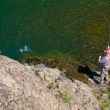
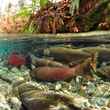
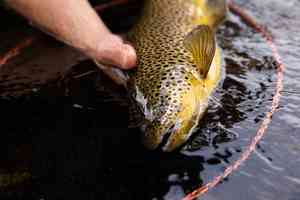


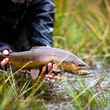
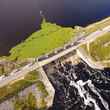
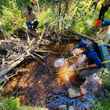

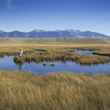




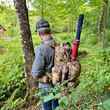




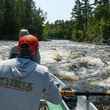

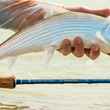
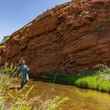

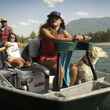
Comments
Mike Ormsby replied on Permalink
As a Canadian fly fisher, who is just as confounded by the current American leadership, I thank you for this article. We have incredible fly fishing opportunities here in Canada. And we welcome American fly fishers as we have always. Unfortunately, though I'm sure most American fly fishers are just as welcoming to Canadian anglers, because of all the current nonsense going on with our southern neighbour, I will not be heading south to fly fish any time soon....certainly not when we have such incredible fishing here in Canada. Also at the moment our Canadian dollar compared to the US dollar is very poor....which in turn means the stronger US dollar goes even further here in Canada than usually. Any way without getting too political, and needing to head out on the water, let me just say I wish your current President was as interested in fly fishing as he is in golf....because as John Gierach said: "They say you forget your troubles on a trout stream, but that's not quite it. What happens is that you begin to see where your troubles fit into the grand scheme of things, and suddenly they're just not such a big deal anymore." Or as the former President Herbert Hoover said: "To go fishing is the chance to wash one's soul with pure air, with the rush of the brook, or with the shimmer of sun on blue water. It brings meekness and inspiration from the decency of nature, charity toward tackle-makers, patience toward fish, a mockery of profits and egos, a quieting of hate, a rejoicing that you do not have to decide a darned thing until next week. And it is discipline in the equality of men - for all men are equal before fish."
Tight lines.
Pages